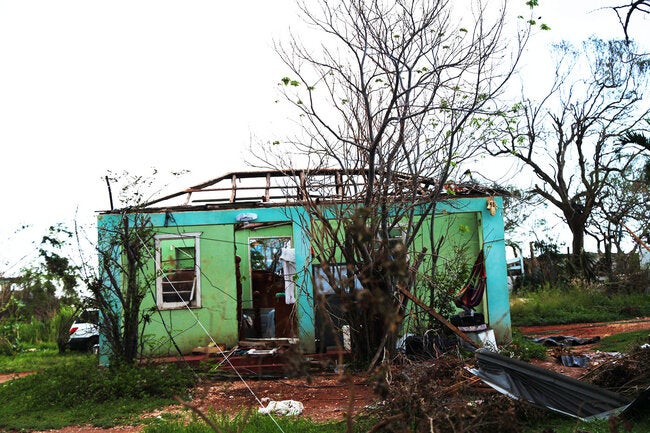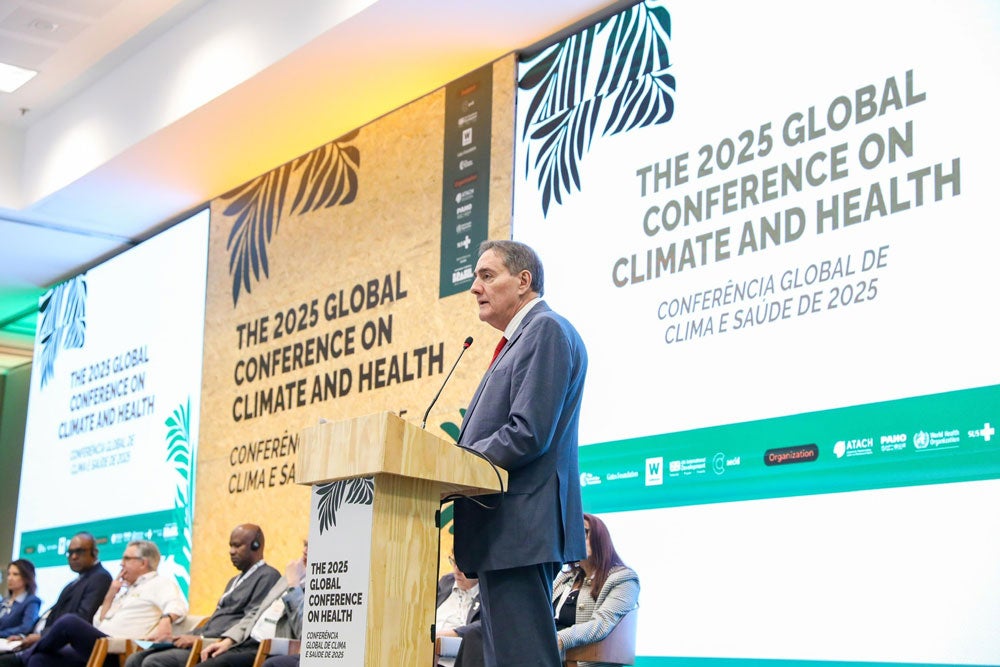
PAHO Director warns of intensifying climate threats to health in the Americas at global conference in Brazil
juillet 30, 2025
Dr. Barbosa urged countries to put health at the center of climate policy and ensure access to climate finance, ahead of key COP30 negotiations.
Brasilia, 29 July 2025 (PAHO) – As the Americas confront record-breaking temperatures, surging disease outbreaks, and increasingly destructive climate events, the Director of the Pan American Health Organization (PAHO), Dr. Jarbas Barbosa, called for urgent action to place health and equity at the center of the climate agenda.
“Populations in situations of vulnerability bear the brunt of these climate impacts, although they are the least responsible for it,” Dr. Barbosa warned. His remarks came during the opening of the 2025 Global Conference on Climate and Health, held in Brasilia on July 29-31 and co-organized by PAHO alongside the Government of Brazil and the World Health Organization (WHO).
The Conference serves as an official preparatory meeting for the 30th United Nations Climate Change Conference of the Parties (COP30), which will also be held in Brazil (Belém, 10–21 November). At that meeting, countries and partners are expected to contribute to the Belém Health Action Plan—a roadmap for integrating health into global climate policy.
Dr. Barbosa described the toll that climate change has already taken in the Region. “2024 was the warmest year experienced in the Region since 1900, with heatwaves being the most lethal climate hazard,” he said.
In addition, wildfires affected 70,000 people across Bolivia, Brazil, Canada, and Chile; floods impacted 5 million people across ten countries, including the catastrophic floods experienced in South of Brazil, and droughts contributed to food insecurity and malnutrition in Brazil and Colombia, affecting 1.2 million people.
Hurricanes impacted over 4.5 million people in the Caribbean, Central and North America, damaging more than 200 healthcare facilities. “Hurricane Beryl was the earliest Atlantic Category 5 storm on record and devastated Grenada and neighboring islands,” he noted.
Meanwhile, climate-sensitive diseases surged across the continent last year. The Region saw a record high number of dengue cases reaching 13 million cases—nearly triple 2023’s total—with over 7,700 deaths,” Dr. Barbosa reported.
PAHO’s key regional strategies
In response to these trends, he commended the Belém Health Action Plan’s approach, saying it “puts health equity at the center and prioritizes intersectoral action and meaningful social participation”.
The Plan, he added, aligns with PAHO’s Policy for Strengthening Equity-Oriented Health Sector Action on Climate Change and Health, adopted by PAHO Member States in 2024. This policy “focuses on promoting climate-resilient health services and ensuring access to health for all, while simultaneously reducing greenhouse gas emissions,” Dr. Barbosa said.
PAHO’s Director also highlighted that both the Belém Health Action Plan and the policy are consistent with two of PAHO’s key regional strategies: the Disease Elimination Initiative, aimed at eliminating 30 diseases and related conditions by 2030, and the Better Care for Noncommunicable Diseases Initiative.
“Both are centered on equity, addressing the social and environmental determinants of health,” he explained. “In this regard, PAHO has worked with regulators and water providers to develop climate-resilient water and sanitation safety plans in 22 countries, benefiting 84.5 million people, seven million of them last year alone”.
Dr. Barbosa also underscored PAHO’s support to countries in building climate-resilient health systems. “We are working with Member States to develop national health adaptation plans, improve health infrastructure, enhance surveillance of climate-sensitive diseases, and develop key measures to anticipate, prevent, prepare for, and respond to climate-related events and mitigate their effects on health.”
Ensuring accessible climate finance
To scale up these efforts, he emphasized the need for financial support. “I would like to highlight another aspect of PAHO’s climate and health policy, and also the official position of the Brazilian Presidency at COP30: the importance of ensuring timely and accessible climate finance,” he said.
“Efficient and targeted investments require solid situation analysis and concrete development plans,” he added, noting that PAHO is supporting countries at both national and subnational levels to carry out feasibility studies and design investments to reduce emissions from the health sector, improve infrastructure, and strengthen early response capacity.
He also pointed to regional commitments to reduce air pollution deaths. “Recognizing that ambient and household air pollution contributes to 24% of deaths from noncommunicable diseases in the Americas, PAHO and WHO co-organized the Second Global Conference on Air Pollution and Health in Cartagena, Colombia, in March,” he said. “As a result, countries committed to reducing deaths from air pollution by 50% by 2040.”
Dr. Barbosa concluded by reaffirming PAHO’s commitment to implementing the Belém Health Action Plan alongside Member States, civil society, and philanthropic and multilateral partners. “PAHO is well-positioned to implement the policies mentioned and the Belém Health Action Plan,” he said. “We remain committed to moving forward together and exploring innovative solutions for shared challenges.”
About the Global Conference on Climate and Health
The 2025 Global Conference on Climate and Health takes place from 29–31 July at the International Convention Center of Brazil in Brasilia. It brings together representatives from governments, the UN system, philanthropy, and civil society to support the development of the Belém Health Action Plan, to be adopted at COP30. The Conference also serves as the annual in-person meeting of the WHO-led Alliance for Transformative Action on Climate and Health (ATACH), a global platform for collaboration and knowledge exchange on climate and health.
